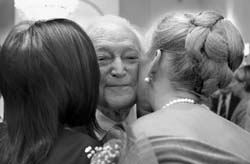Author of <I>The Damned Kings</I> meets with author of <I>Ukraine Is Not Russia</I> at a Kyiv soiree

In the past few years musical soirees at the Russian Embassy in Kyiv have become a tradition. Last Thursday’s event was distinguished by such extraordinary guests as the celebrated French writer Maurice Druon and Ukraine’s ex-president, Leonid Kuchma. Russian Ambassador Viktor Chernomyrdin noted, “Before, Mr. Kuchma had no time to attend our soirees because he was much too busy, but now he is retired, so he decided to attend. Please enjoy the lovely music and the artists’ supreme mastery.
“I have another guest today. I would like to introduce my friend, the well-known writer Maurice Druon, who was a close associate of Charles de Gaulle and member of the French resistance. He is the author of the hymn “Chant des Partisans,” a series of popular historical novels called Les Rois Maudits, and the series Les Grandes Familles, and a member of the Academie franзaise. I met Maurice a few years ago, and it turns out that we are fellow countrymen. Like me, Druon’s parents were born in Orenburg, where they lived until the October Revolution. I am so pleased that not just a writer but a citizen of the world is attending this soiree.” The Kyiv Camerata, conducted by Valery Matiukhin, played “La Blanche Neige” by the contemporary French composer Francis Poulenc, especially for Druon. This was followed by a program featuring the works of Andrei Eshpai (he turned 80 this year) performed by the Kyiv Camerata and the singer Liudmyla Voinarovska.
The second part of the soiree featured some works composed by Andrei Petrov (who just turned 75). The violinist Olha Morozova and the pianist Dmytro Tavanets gave a virtuoso performance of Gypsy Rhapsody, while Ukrainian National Opera soloists Anzhela Shvachka and Iryna Semenenko brilliantly sang Petrov’s popular romantic songs from the films Secrets of Petersburg, Put in a Word for a Poor Hussar, and Cruel Romance to the accompaniment of pianist Kostiantyn Fesenko. There were more surprises in store for the audience. At the audience’s request, the two singers sang “A Romance about a Romance” (lyrics by Bella Akhmadulina) and Jacques Offenbach’s “Barcarole” for Druon.
“Terrific! A wonderful concert,” Druon exclaimed irrepressibly (at age 87 he is extremely cheerful and amiable). “I adore music. Today for the first time I heard the works of Petrov and Eshpai, and I liked them very much. In general, my favorite composer is Bach; I also like the music of 20th-century Slavic composers. I first visited Kyiv 44 years ago, and now I’m here again. You have a wonderful city. Things have changed so much. Kyiv has become much more beautiful.” This time around Druon was a guest of the Molodist (Youth) film festival, where he presented the documentary film Russian Roots, or Once Upon a Time in Orenburg, directed by Olena Fetisova at Ukraine’s Interfilm Studios. Two out of the four main characters in the film are supposed to give speeches at the premiere: Messrs. Chernomyrdin and Druon. (Look for an interview with the French writer in an upcoming issue of The Day). Profiting from the evening’s literary ambience, The Day’s correspondent put some questions to Leonid Kuchma, who is also a writer of sorts.
“Maurice Druon is writing his memoirs. He told The Day that one of the chapters will deal with Ukraine. What do you think he will write about this country?”
“It will be interesting to read them, but this will be a look from the sidelines, which is always a bit subjective. I would like our Ukrainian writers to write about what they see and what they think has changed in the country. Life rushes by quickly, and the events of tomorrow become part of history. I would like to read a book that reflects the present day, a book that the next generation could read and learn what really happened. What matters for me is accounts by eyewitnesses, not onlookers.”
“You can also be called a writer after the publication of Ukraine Is Not Russia.”
“I was forced to become a writer.”
“Will there be another book? What about? How do you write: do you use a tape- recorder or computer?”
“The book will deal with the time when I was actively involved in events. I mean the time between the two revolutions: from Independence Day until the Orange Revolution. I have already written many chapters, but it is difficult to say when I will finish. You know, a participant in recent events always finds it difficult to describe them. I don’t want to lie, but if I write the truth, I could hurt some of those who are in power today. I tape-record my memoirs and almost never use a computer.”
The guests congratulated the singers Shvachka and Semenenko on a successful performance and asked where else they can see them perform. Anzhela and Iryna said that for this concert they sang just a fraction of the joint program that they recently presented at the National Philharmonic. The program included works by such contemporary composers as Petrov, Gavrylin, and Tariverdiev. Audiences are particularly fond of their romantic songs. The singers invited everyone to see them in Verdi’s Rigoletto at the National Opera on Nov. 17.
“This concert filled me with joy,” said Marianna Karabyts, a music scholar and professor at the National Musical Academy of Ukraine (widow of the composer Ivan Karabyts). “Eshpai and Petrov were Ivan’s friends, and they used to visit us in Kyiv. We vacationed together in Vorzel. Andrei Eshpai would tell us how he studied with the magnificent Mykola Miaskovsky, a Soviet classic and a very intelligent person (Eshpai was his last pupil).
“Petrov and Eshpai are two composers who possess the extraordinary gift of composing everything, be it an opera, film score, romantic song or quartet, academic or popular music. They are not snobs, but people who radiate light: you want to be next to them and listen to them attentively.”






